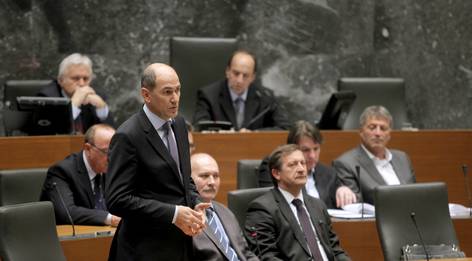NEWS
Prime Minister Janez Janša: "Fear of shouldering the responsibility is the key motive behind the attempts to block the bad bank project."
At today's session of the National Assembly, the Prime Minister of the Republic of Slovenia, Mr Janez Janša, said that a gap of several billion euros in the Slovenian banking system represents "the main problem of this country and its taxpayers," and went on to express his concern that the burden would pass on to "several future generations".
"If Slovenia does not continue with the rehabilitation of its banks, it will go bankrupt before the end of this year," and "we will be forced to accept the conditions of international financial aid in one or another form".
"This problem has been ignored for four years and has run out of control. And not only for this generation of taxpayers but also for future generations. A policy of ignorance is no longer an option," stressed Mr Janša. In his opinion, "the fear of shouldering the responsibility is the key motive behind the attempts to block the bad bank project". The law envisages four extensions of the statute of limitations for criminal offences which are often the primary cause of bad loans.
It is not true that there are several other possible solutions to this problem in the Slovenian banking system, emphasised Mr Janša. We must rehabilitate our banks and to this end, a law was adopted. Thanks to the decision of the Constitutional Court, this law was not put on hold at the end of last year, and its provisions are being applied.
The Prime Minister also explained that the Government had appointed four non-executive directors who must complete the procedure for the setting up of an agency for the rehabilitation of Slovenian banks. Three of them are foreign financial experts who were not involved in the creation of this problem but had instead tackled such issues in other countries, especially Scandinavian. These appointments were harmonised with the European Central Bank and the International Monetary Fund in line with Slovenia's obligations under the Eurosystem. The ensuing implementing regulations are also being harmonised with the ECB. Some have already been harmonised, while the rest are due in a few days. As soon as the documents are harmonised, they will be approved by the Slovenian Government.
The policy of the incoming government will dictate the tempo of these processes in the future, and will define whether this act which now provides a chance to solve this crucial economic problem in Slovenia will stay in force.
In the words of the Prime Minister, the Slovenian public does not consider the rehabilitation of banks to be the key problem, for them this problem simply does not exist. He continued with a rhetorical question, if in the coming weeks and months we will see attempts to sweep the problem under the carpet once again.
To the question about the Government's position on amendments governing referendums raised by Deputy Majda Potrata, the Prime Minister replied that the Government had not adopted a position since it was not obliged to take a stance on all procedures. Should the Government nevertheless adopt a position on this issue, it will notify the National Assembly.





